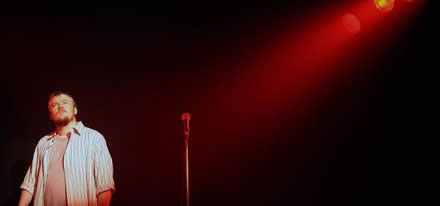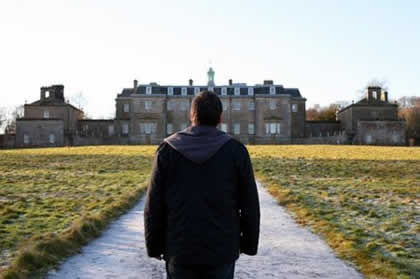 One of the reasons that I feel privileged to be a contributor to Cinema without Borders is because it aims to celebrate independent cinema from different nations and cultures, reminding us that although mainstream Hollywood has its place, there should always be another voice that reflects and represents people from all different nations.
One of the reasons that I feel privileged to be a contributor to Cinema without Borders is because it aims to celebrate independent cinema from different nations and cultures, reminding us that although mainstream Hollywood has its place, there should always be another voice that reflects and represents people from all different nations.
Having been born in Scotland and lived here my entire life, I am filled with a particular kind of excitement and pride when I come across independent cinema produced from my own culture. This probably rings true for many cinema enthusiasts who are keen to see how a film maker has encapsulated the issues of their nation and society. Independent cinema shows us something that we are able to relate to, often grittier and hard hitting than what other more commercial films are able to achieve. Such films make me sit up and take notice, I feel like a part of my surroundings, my heritage the current political and social climate that influence my life are being presented to me on the big screen. I feel like part of my identity has been tapped into and I can have a direct affinity to such films.
Scotland has a long tradition of producing terrific independent cinema. Only a few years ago Andrea Arnold’s Red Road (2006) became the toast of Cannes. Ken Loach has also given the world some of the most iconic pieces of cinema in the form of My Name is Joe, Sweet 16 and Ae Fond Kiss. All these films were shot in areas not far from where I live, using slang vocabulary I hear every day. Their proximity to my life and reality gives them an added significance and meaning to me. Our familiarity with areas and with character types gives independent cinema an air of truth that resonates with us.
Recently a fantastic Scottish Independent film has made its way on to the big screen in the UK and is creating a buzz about it. Crying with Laughter (written and directed by award winning Justin Molotnikov) was the crown jewel of last year’s Edinburgh Film Festival and since then has gone on to receive mass critical acclaim around the world and most recently won big at the Celtic Media Awards.
Crying with Laughter focuses upon aspiring stand up comedian Joey Fisk (masterfully played by Stephen McCole), who whilst king of his local comedy club has many demons to deal with in his personal life. Living a destructive lifestyle of excessive drinking and drug use, Joey’s life begins to unravel. Shunning his responsibilities and commitments Joey quickly finds himself without an ally to stop him sinking into despair. Joey turns to an old face from his past for help but soon  becomes embroiled in a revenge plot set out by his former friend who can’t come to terms with traumas that occurred in their childhood. The drama builds to a thrilling conclusion that shakes Joey into seeing the important things in life.
becomes embroiled in a revenge plot set out by his former friend who can’t come to terms with traumas that occurred in their childhood. The drama builds to a thrilling conclusion that shakes Joey into seeing the important things in life.
The film navigates through dark humor to thriller. It is a film full of biting dialogue and cutting humor, juxtaposed with scenes of real sadness and tension. It gives the feel that McCole really invested a part of himself in playing Joey and Molotnikov’s writing and direction truly give it the edge and the heart that makes the film both shocking and yet endearing. Through daring camerawork it shows a darker side to Edinburgh, a city associated with a friendly front, welcoming the world to its festival and New Year’s Celebrations. It’s a film with twists and turns that keeps you gripped till its dramatic climax. It’s most important element though is the complex nature of Joey, making this film character driven. It is Joey’s journey and turmoil that got me gripped to the drama. His initial recklessness was curiously appealing, it was dangerous and intriguing. But once we realize that Joey is a father our opinions change, he needs to become responsible. We understand the drama through Joey’s transformation.
Whilst watching the film one of the first elements that stuck out for me was Joey’s stand up comedy routine. There was for me something very distinctive about the humor and the delivery; the nature of Joey’s jokes and the story telling form they took evoked in me something I define as characteristically Scottish. Keen to get an insider’s opinion, Cinema without Borders got in contact with writer and director Justin Molotnikov to shed some light on his views towards national cinema and how the film has a distinctive Scottish flavor to it. Molotnikov notes: “We deliberately mined the black comedy in Crying with Laughter because we wanted to truthfully reflect how we as Scots use it deal with tough situations. For me, dark humor is inherent in us. I feel it is used as both a defense mechanism to distance ourselves from dealing with emotion or harsh circumstances, as well as a bonding tool to disarm people and bring them together in times of difficulty. It’s not always pleasant or tasteful but that is the very reason it works, it balances us.”
 However even though independent cinema can really touch upon themes and characteristics specific to certain cultures, there are underlying elements that remain universal, and Joey’s struggle to regain control of his life and make amends for the mess he finds himself in is something that all audiences regardless of nationality can relate to. Molotnikov comments;
However even though independent cinema can really touch upon themes and characteristics specific to certain cultures, there are underlying elements that remain universal, and Joey’s struggle to regain control of his life and make amends for the mess he finds himself in is something that all audiences regardless of nationality can relate to. Molotnikov comments;
“On a human level I would also really like to think that it is this depth of character throughout the film and the truth with which the cast performed these roles that also makes the film more interesting than the gloss and shine we often see with characters from mainstream cinema. Crying with Laughter is a tough film at times to watch but we didn’t want to make something that was relentlessly bleak, we wanted to connect with our audience and give them something that was thought provoking as well as entertaining, I think we achieved that for the majority of the audience that saw it.”
Quality cinema will always be able to present characters and stories that can relate to all audiences on a emotional level. The mark of a film should rest upon how effectively it has translated emotions to its viewer regardless of background or culture. Independent cinema should act as a voice, both for its culture but also for its art form. It should remind us the importance of representing our culture on screen and the significance of translating emotions and themes and across boundaries and borders. For me, Crying with Laughter is refreshing in how uncompromised it appears and how boldly it meshes humor with drama. It’s a complex film with a distinctive Scottish feel, it’s both hardy and resilient, both humorous and dark. It is a proud example of how independent cinema should be; challenging, daring and provocative. I thoroughly recommend it and find it to be a shining example of what independent cinema represents. Perhaps Molotnikov summarizes it best when he says;
‘Good independent films make us feel more connected to cinema and to other people and cultures, they ask us tough questions and they affect us more personally than the polished and homogenized product of the studios and corporations. The studio films have their place and reflect a different aspect of our culture but they should never be allowed to be the only mirror by which we view ourselves.
